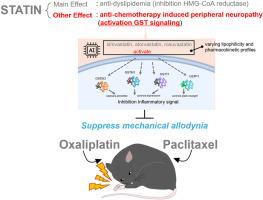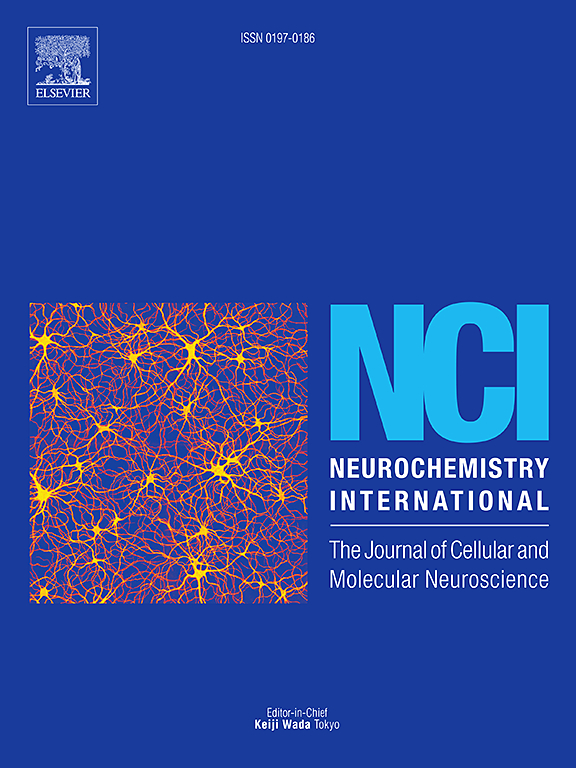Statins ameliorate oxaliplatin- and paclitaxel-induced peripheral neuropathy via glutathione S-transferase
IF 4.4
3区 医学
Q2 BIOCHEMISTRY & MOLECULAR BIOLOGY
引用次数: 0
Abstract
Some therapeutic agents have been found to have effects beyond their primary indications. Peripheral neuropathy, a common side effect of chemotherapy, remains inadequately treated. Identifying additional properties of existing medications could thus uncover novel therapeutic avenues. Previous studies have identified an additional effect of simvastatin in reducing neuropathy; however, the mechanism underlying this effect remains unclear. We investigated the novel effects of statins on chemotherapy-induced peripheral neuropathy in mice. Mice treated with oxaliplatin or paclitaxel did not show exacerbation or improvement in cold sensations upon acetone testing with statin administration. However, concurrent oral statin treatment mitigated the nociceptive response to mechanical stimuli induced by each anti-tumor agent. Co-administration of a glutathione S-transferase inhibitor, which modulates redox reactions, abolished the ameliorative effect of statins on mechanical nociceptive behavior. Additionally, the glutathione S-transferase inhibitor did not affect normal sensory perception or impair the anti-tumor effect of chemotherapy agents. A search for GST-associated molecules and pathways using artificial intelligence revealed that GST regulates inflammatory cytokines as a regulatory or causative gene. Our findings suggest that statins have class effects that ameliorate cytotoxic anti-cancer drug-induced mechanical allodynia via GST pathway activation.

他汀类药物通过谷胱甘肽-S-转移酶改善奥沙利铂和紫杉醇诱发的周围神经病变
一些治疗药物被发现具有超出其主要适应症的效果。周围神经病变是化疗的一种常见副作用,但治疗效果不佳。因此,识别现有药物的其他特性可以发现新的治疗途径。先前的研究发现辛伐他汀具有减轻神经病变的额外作用,但这种作用的机制仍不清楚。我们研究了他汀类药物对化疗引起的小鼠周围神经病变的新作用。接受奥沙利铂或紫杉醇治疗的小鼠在服用他汀类药物进行丙酮测试时,冷感没有出现加剧或改善。不过,同时口服他汀类药物可减轻每种抗肿瘤药物诱发的机械刺激痛觉反应。同时服用谷胱甘肽-S-转移酶抑制剂(可调节氧化还原反应)可消除他汀类药物对机械痛觉行为的改善作用。此外,谷胱甘肽-S-转移酶抑制剂不会影响正常的感官知觉,也不会损害化疗药物的抗肿瘤作用。利用人工智能搜索谷胱甘肽相关分子和通路发现,谷胱甘肽作为调节基因或致病基因调节炎症细胞因子。我们的研究结果表明,他汀类药物具有类药物效应,可通过激活 GST 通路改善细胞毒性抗癌药物诱导的机械异感。
本文章由计算机程序翻译,如有差异,请以英文原文为准。
求助全文
约1分钟内获得全文
求助全文
来源期刊

Neurochemistry international
医学-神经科学
CiteScore
8.40
自引率
2.40%
发文量
128
审稿时长
37 days
期刊介绍:
Neurochemistry International is devoted to the rapid publication of outstanding original articles and timely reviews in neurochemistry. Manuscripts on a broad range of topics will be considered, including molecular and cellular neurochemistry, neuropharmacology and genetic aspects of CNS function, neuroimmunology, metabolism as well as the neurochemistry of neurological and psychiatric disorders of the CNS.
 求助内容:
求助内容: 应助结果提醒方式:
应助结果提醒方式:


